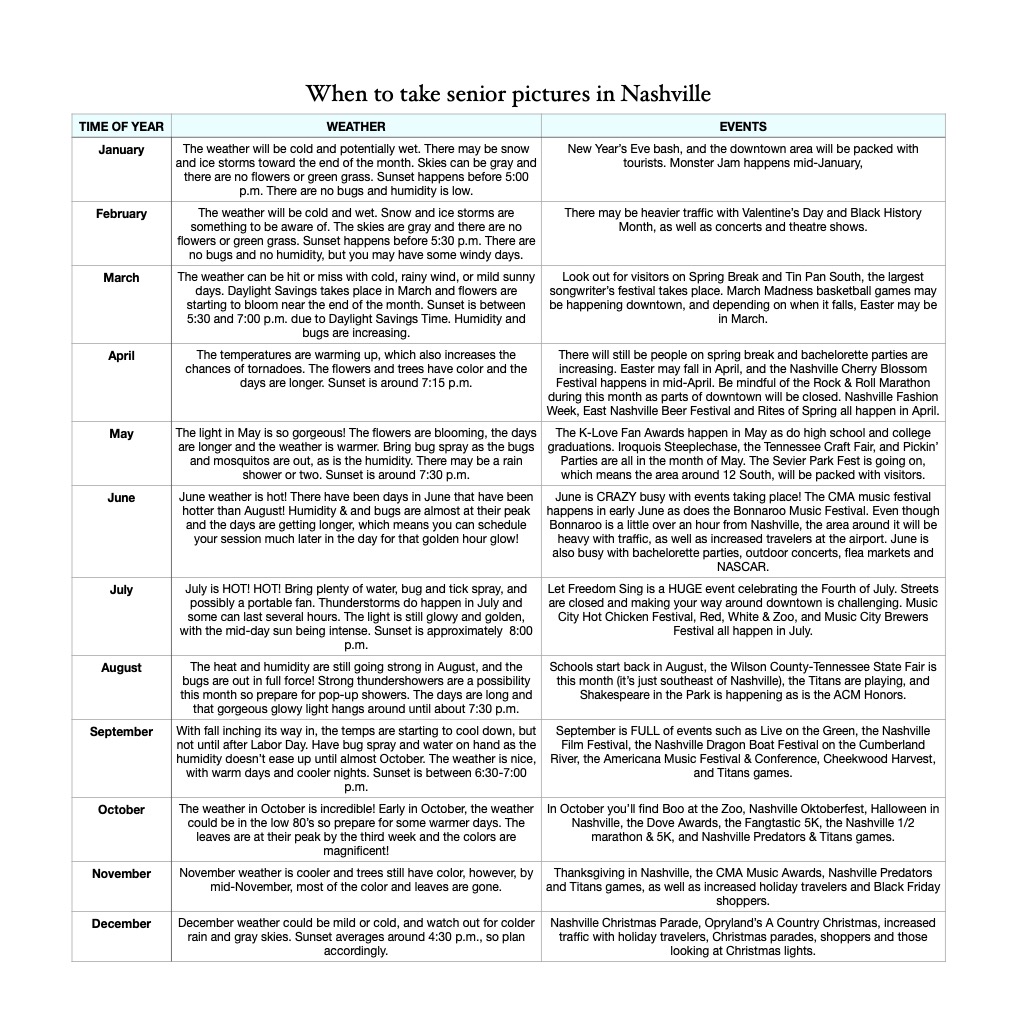Best time of year for senior photos

Planning your senior photos requires careful consideration. You aim for perfection in your hair, nails, makeup, and outfit. However, scheduling your Nashville senior session at an inappropriate time of year could lead to disappointment. When arranging your senior photos, take into account: Ultimately, the best time of year for senior photos is when you feel […]
Planning your senior photos requires careful consideration. You aim for perfection in your hair, nails, makeup, and outfit. However, scheduling your Nashville senior session at an inappropriate time of year could lead to disappointment. When arranging your senior photos, take into account:
- Time of year
- Time of day
- Calendar of Events
Ultimately, the best time of year for senior photos is when you feel confident, comfortable, and in line with the style you want.
If you are wanting your senior pictures taken in various locations in and around Nashville, be sure to take a look at this chart to see the best times of year for senior photos in Nashville.
*Events subject to change

Seasons
Winter:
Nashville, Tennessee experiences a relatively mild winter compared to many other parts of the United States. Winter in Nashville typically spans from December to February. Here’s a general description of the weather you can expect during this season:
- Temperature: Nashville’s winter temperatures tend to be quite variable. Daytime highs can range from the upper 40s to the mid-50s Fahrenheit (8-15°C), while nighttime lows can dip into the mid-20s to low 30s Fahrenheit (-4 to 1°C). Occasionally, there may be colder periods with temperatures below freezing.
- Precipitation: Winter in Nashville sees a mix of rain and occasional snowfall. The city receives an average of 4-5 inches (10-12 cm) of snow per year, typically spread out over a few light snowfalls. Rainfall is more common, with Nashville experiencing around 10-12 rainy days per month in the winter.
- Cloud Cover: The skies in Nashville during the winter can be quite cloudy, with overcast conditions prevalent, especially during rainy spells. However, there are still some clear and sunny days, particularly in December and January.
- Daylight Hours: Winter days in Nashville are shorter, with daylight hours ranging from about 9 to 10 hours per day. This means the nights are longer, and the sun sets earlier in the afternoon.
- Winter Storms: While Nashville doesn’t typically experience severe winter storms like those in northern states, it can occasionally be affected by ice storms or freezing rain, which can lead to hazardous road conditions.
It’s important to note that weather patterns can vary from year to year, so it’s always a good idea to check a reliable weather forecast for the most up-to-date information if you plan to be in Nashville during the winter months.
Spring:
Nashville, Tennessee experiences a pleasant and transitional spring season, which typically spans from March to May. Here’s what you can expect weather-wise during this time:
- Temperature: Spring in Nashville is marked by a gradual warming of temperatures. Early in the season, daytime highs can range from the upper 50s to low 60s Fahrenheit (14-17°C). As spring progresses, temperatures gradually increase, with highs reaching the 70s and occasionally the low 80s Fahrenheit (21-28°C) by late spring. Nighttime lows generally range from the 30s to 50s Fahrenheit (1-15°C), but they tend to become milder as spring progresses.
- Precipitation: Spring in Nashville can bring a mix of rain and occasional thunderstorms. Rainfall is relatively evenly distributed throughout the season, with March and April being somewhat rainier compared to May. Be prepared for occasional showers, and it’s advisable to have an umbrella, rain boots or raincoat handy. Snow and ice have also been recorded in early March.
- Blooming Season: Spring is a beautiful time in Nashville as trees and flowers start to bloom. Cherry blossoms, dogwoods, and other flowering trees contribute to the city’s vibrant colors during this season. The city’s parks and gardens, such as Cheekwood Botanical Garden and the Nashville Zoo, are great places to enjoy the springtime flora.
- Daylight Hours: Daylight hours gradually increase throughout the spring months, with the days becoming longer as summer approaches. By late spring, you can expect around 14-15 hours of daylight per day.
- Tornado Awareness: It’s worth noting that spring in Tennessee, including Nashville, is also the season when severe weather, including tornadoes, is more likely. Be aware of weather forecasts and have a plan in place for severe weather alerts.
Overall, spring in Nashville offers a comfortable and enjoyable climate for exploring the city and enjoying outdoor activities as the city awakens from winter’s slumber.
Summer:
Nashville experiences hot and humid summers, which typically span from June to August. Here’s a description of the weather you can expect during this time:
- Temperature: Summers in Nashville are characterized by high temperatures and humidity. Daytime highs often soar into the 90s Fahrenheit (32-37°C) and can occasionally reach into the low 100s Fahrenheit (37-40°C). Nighttime temperatures typically stay in the 70s Fahrenheit (21-27°C). Heatwaves with prolonged periods of extreme heat are not uncommon during the summer months.
- Humidity: Nashville experiences high humidity levels during the summer, which can make the already warm temperatures feel even hotter. The combination of high heat and humidity can be uncomfortable for some, so staying hydrated and seeking shade or air-conditioning when needed is important.
- Precipitation: Summer in Nashville can be quite rainy, with occasional afternoon thunderstorms. These storms can bring heavy rain, lightning, and gusty winds. Rainfall is often scattered and can vary from year to year, but it’s advisable to be prepared for sudden downpours.
- Daylight Hours: Summer days in Nashville are long, with daylight hours lasting approximately 14-15 hours per day. This provides ample time for outdoor activities and exploring the city.
- Air Quality: In the summer, the combination of heat and humidity can sometimes lead to poor air quality, especially on days with little wind. People with respiratory issues may want to take precautions on such days.
- Tornado Awareness: While tornadoes can occur in Tennessee at any time of year, they are more common in the spring and early summer. It’s important to stay informed about weather conditions and have a plan in place for severe weather alerts.
Overall, summers in Nashville are hot and humid, making them ideal for those who enjoy warm weather and outdoor activities. However, it’s essential to stay hydrated, wear sunscreen, and be prepared for the occasional thunderstorm when spending time outside during the summer months.
Fall:
Nashville experiences a beautiful and pleasant fall season, which typically spans from September to November. Here’s a description of the weather you can expect during this time:
- Temperature: Fall in Nashville is characterized by gradually cooling temperatures. September often starts with daytime highs in the 80s Fahrenheit (around 27-32°C), but as the season progresses, temperatures begin to drop. By November, daytime highs typically range from the upper 50s to the mid-60s Fahrenheit (around 15-21°C), with nighttime lows dropping into the 40s and eventually into the 30s Fahrenheit (around 4-10°C).
- Precipitation: Fall in Nashville generally sees lower rainfall compared to the summer months. September is still relatively warm and can have occasional showers or thunderstorms, but as the season progresses, rain becomes less frequent. October is often one of the drier months, making it an ideal time to enjoy outdoor activities.
- Fall Foliage: One of the highlights of fall in Nashville is the stunning display of fall foliage. The leaves on trees throughout the city and surrounding areas turn vibrant shades of red, orange, and yellow. The nearby Natchez Trace Parkway and Great Smoky Mountains National Park offer excellent opportunities for leaf peeping.
- Daylight Hours: Daylight hours gradually decrease throughout the fall months, with the days becoming shorter as winter approaches. By late November, you can expect around 10-11 hours of daylight per day.
Overall, fall in Nashville offers a comfortable and picturesque climate, making it a popular time for scheduling senior photos. Both residents and visitors to enjoy the city’s natural beauty and outdoor attractions. The vibrant fall foliage and pleasant weather make it one of the best times of year for senior photos fantastic time to explore the region.

No matter what you decide, there’s not a bad time of year to take senior photos in Nashville! Add layers and chunky sweaters in winter, grab a bouquet of flowers for spring, show those bright colors and floppy hats in summer, and bask in the bright reds and oranges in the fall. Let your senior photos reflect who you are, no matter what time of year!
Want some fun locations to take your senior photos in Nashville? Click these links to find out more!
Best places in Nashville to take senior photos
Best Nashville Murals for photos
Need help making your senior session stress free? Grab my FREE SENIOR GUIDE to learn more!
the completely free guide
tips to make your senior session
stress free
A lot of moving parts go into planning your senior session: clothes, hair, makeup- ALL THE THINGS and I know it's easy to feel like a hot mess! Grab my free guide to plan the perfect stress free day.
send me my guide
@neelyrobertsPhoto
On